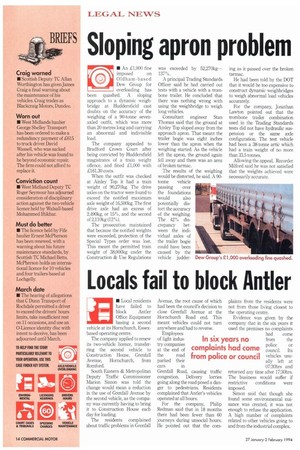Sloping apron problem
Page 16

If you've noticed an error in this article please click here to report it so we can fix it.
• An £1,000 tine imposed on Oldham-based Dew Group for overloading has been quashed. A sloping approach to a dynamic weighbridge at Huddersfield cast doubts on the accuracy of the weighing of a 90-tonne sevenaxled outfit, which was more than 20 metres long and carrying an abnormal and indivisible load.
The company appealed to Bradford Crown Court after being convicted by Huddersfield magistrates of a train weight offence, and fined .C1,000 with £161.30 costs.
When the outfit was checked at Ainley Top it had a train weight of 90,270kg. The drive axles on the tractor were found to exceed the notified maximum axle weight of 16,500kg. The first drive axle had an excess of 2,490kg, or 15%, and the second of 2,110kg (12%).
The prosecution maintained that because the notified weights were exceeded, protection of the Special Types order was lost. This meant the permitted train weight of 38,000kg under the Construction & Use Regulations was exceeded by 52,270kg137%.
A principal Trading Standards Officer said he had carried out tests with a vehicle with a trombone trailer. He concluded that there was nothing wrong with using the weighbridge to weigh long vehicles.
Consultant engineer Stan Thomas said that the ground at Ainley Top sloped away from the approach apron. That meant the trailer bogie was eight inches lower than the apron when the weighing started. As the vehicle left the apron, the ground again fell away and there was an area of broken tarmac.
The results of the weighing would be distorted, he said. A 90tonne vehicle passing over the foundations vehicle judder. would also potentially distort the accuracy of the weighing. The 42% discrepancy between the individual axles of the trailer bogie could have been caused by the I Dew Group's £1,000 overloading fine quashed. ing as it passed over the broken tarmac.
He had been told by the DOT that it would be too expensive to construct dynamic weighbridges to weigh abnormal load vehicles accurately.
For the company, Jonathan Lawton pointed out that the trombone trailer combination used in the Trading Standards tests did not have hydraulic suspension or the same axle configuration. The test vehicle had been a 38-tonne artic which had a train weight of no more than 33.5 tonnes.
Allowing the appeal, Recorder Milford said he was not satisfied that the weights achieved were necessarily accurate.




















































































